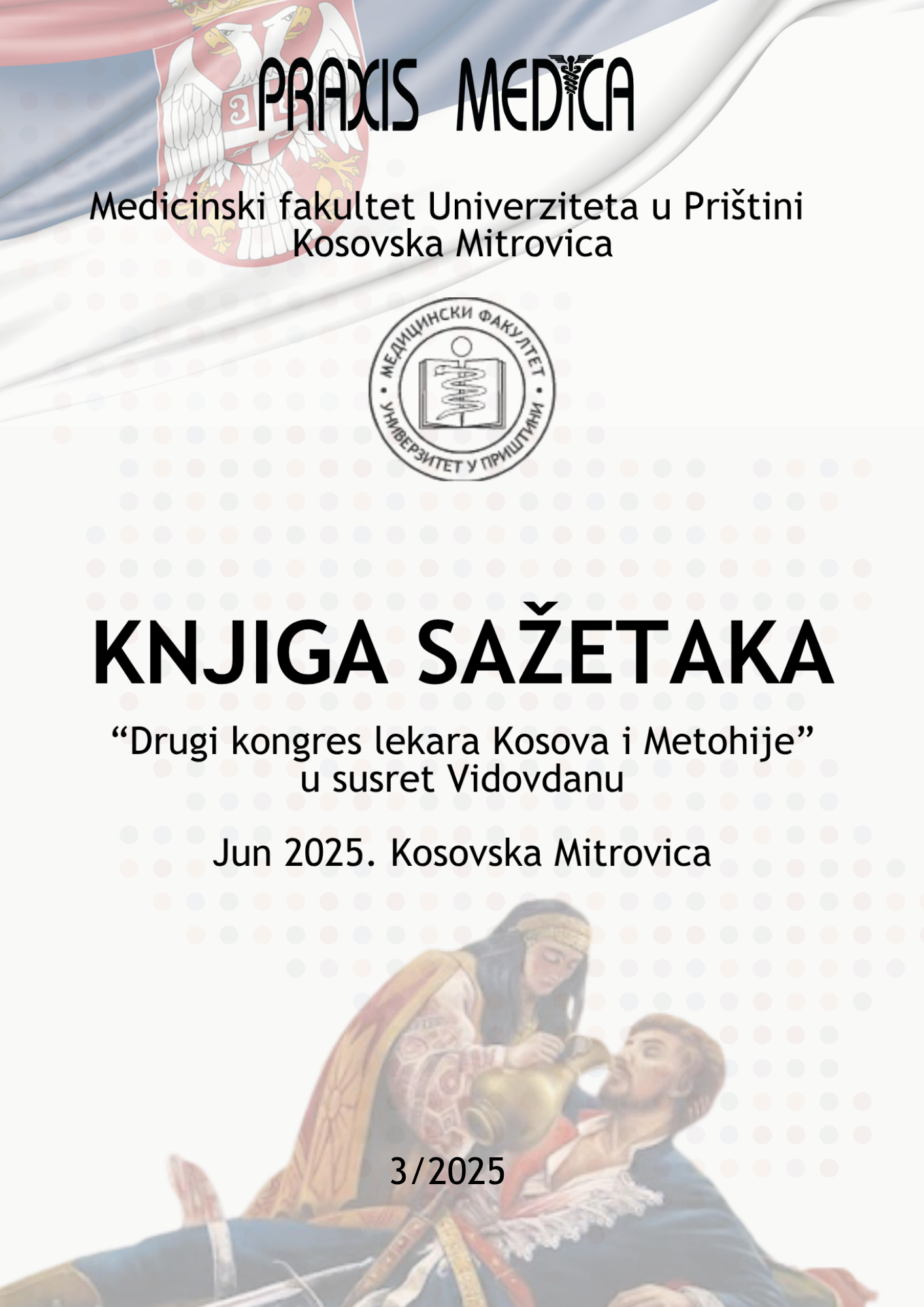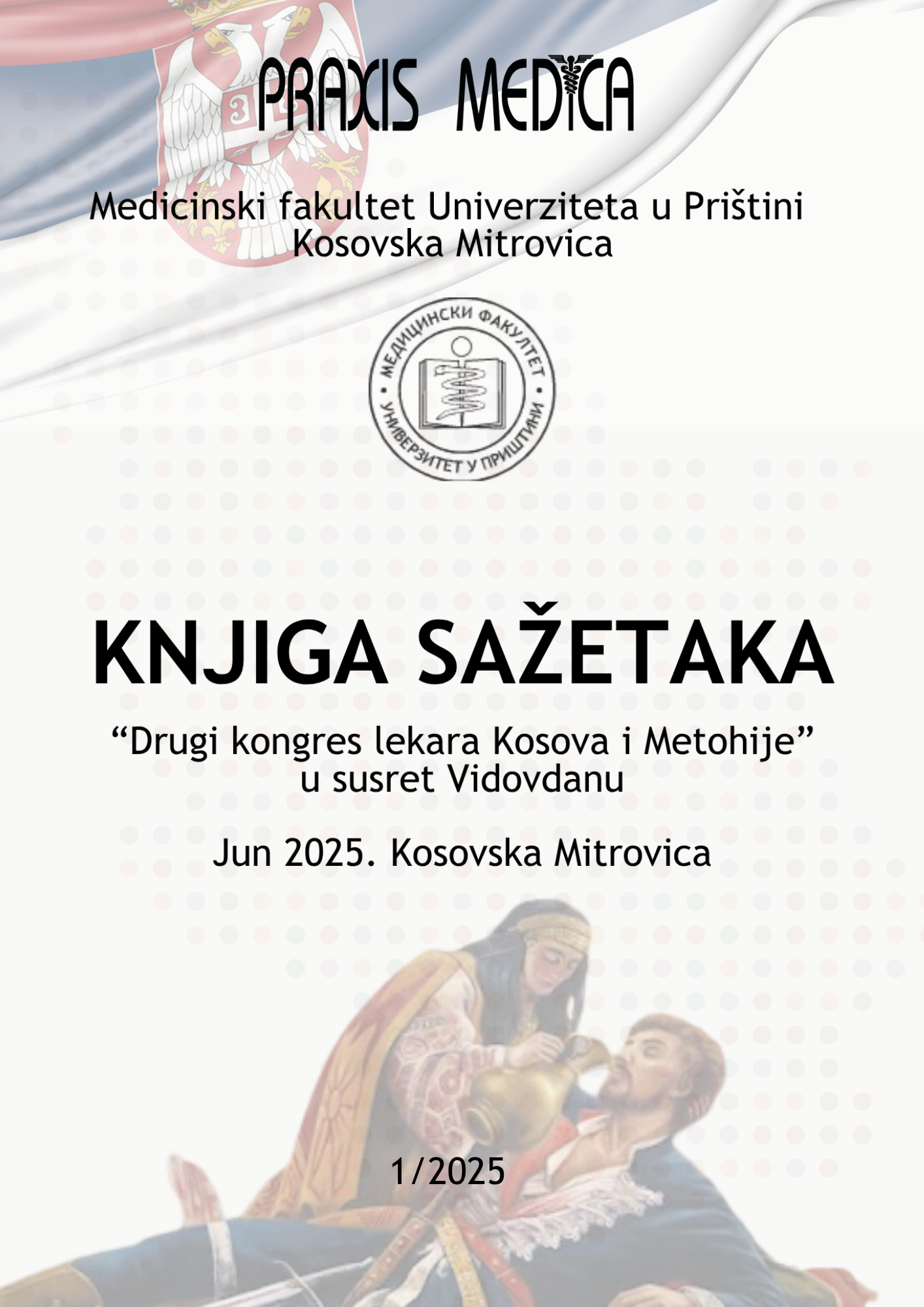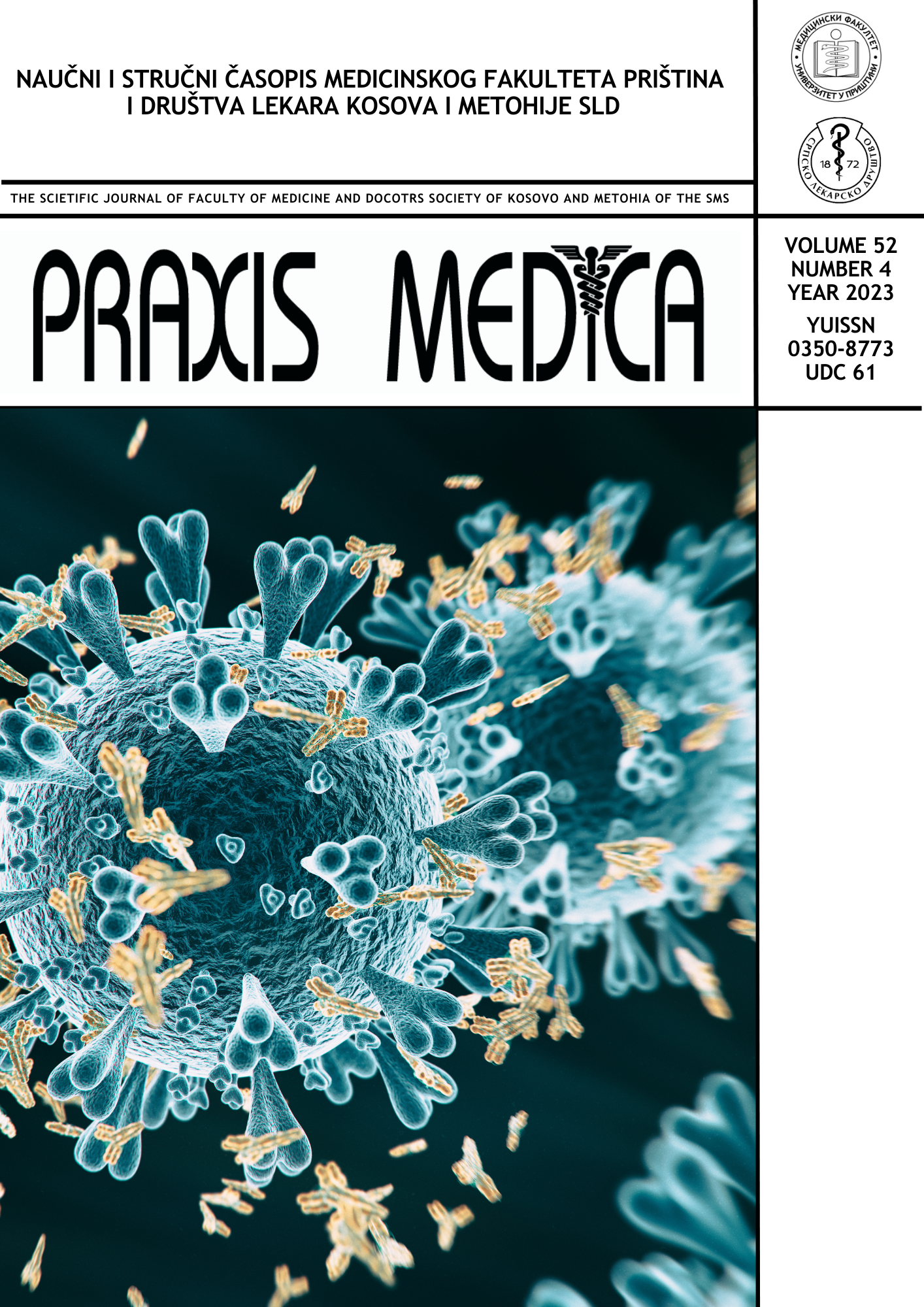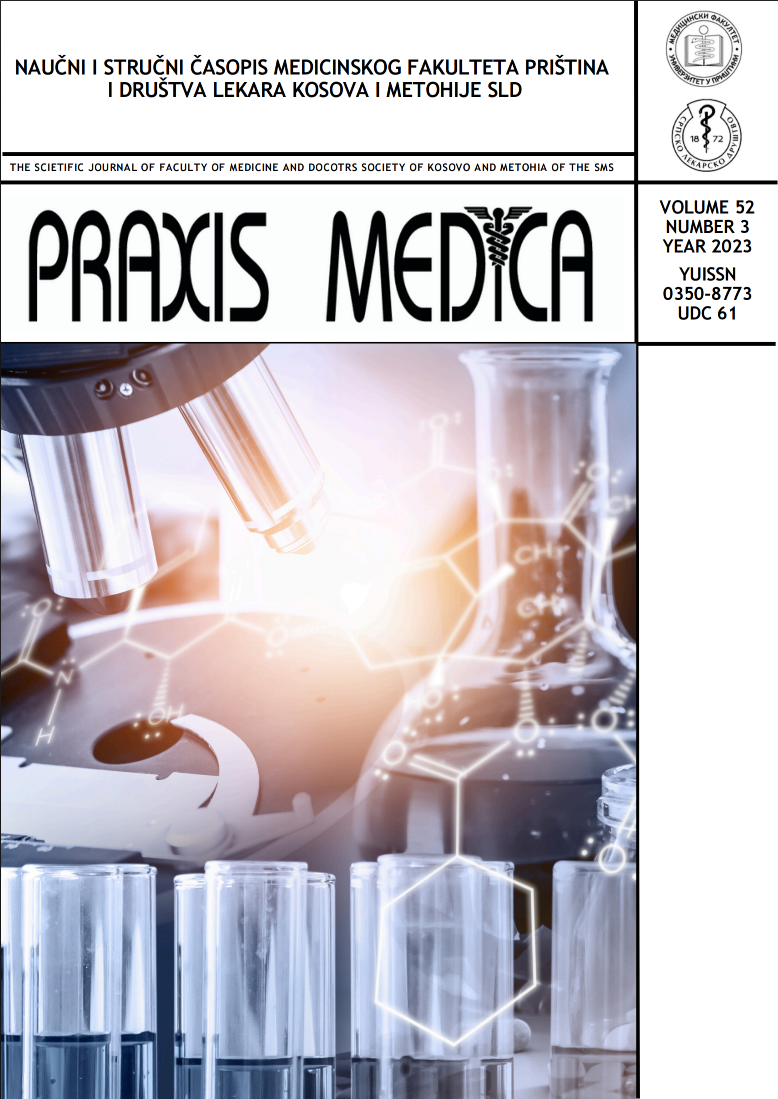Current issue
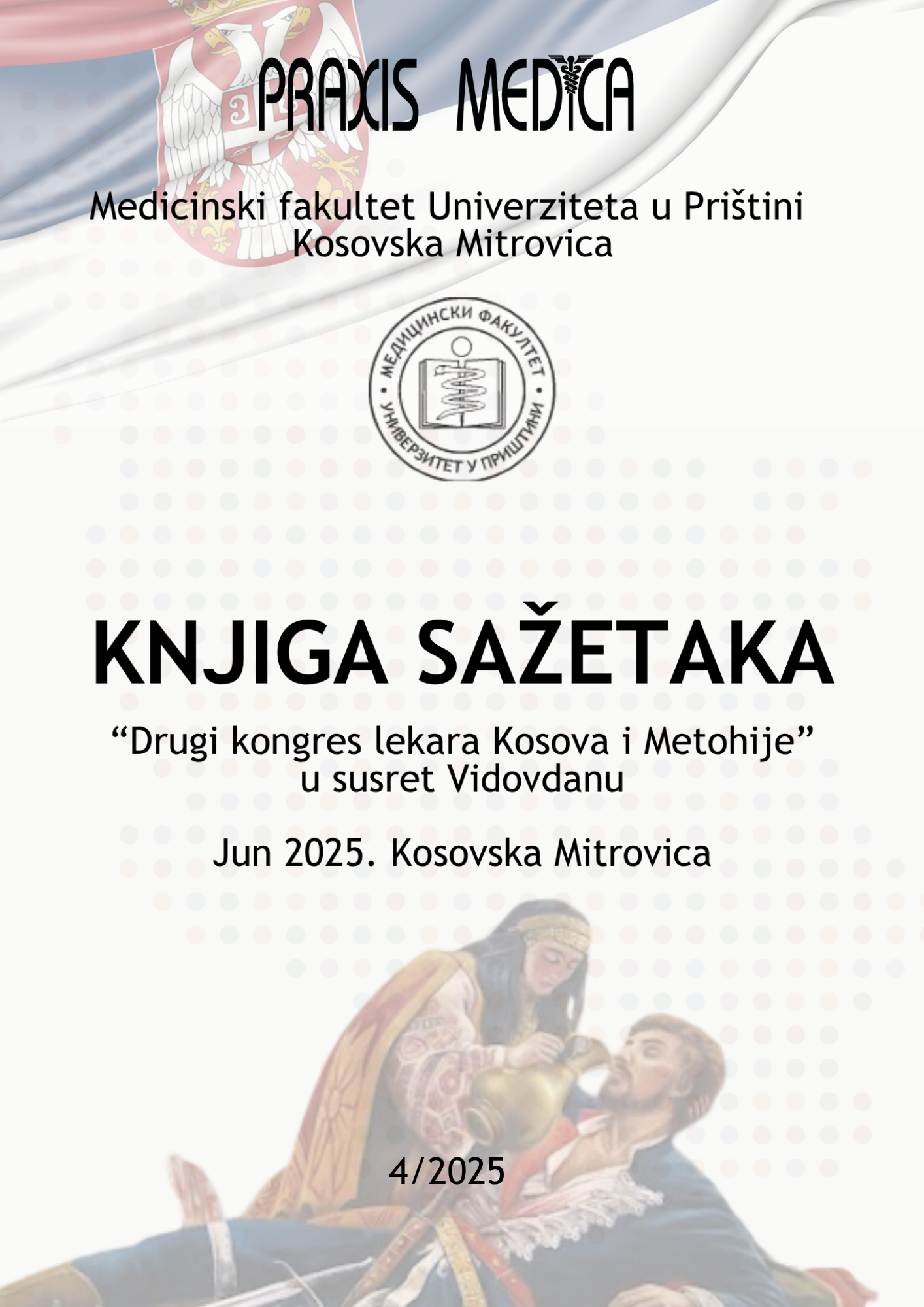
Volume 53, Issue 4, 2025
Online ISSN: 2560-3310
ISSN: 0350-8773
Volume 53 , Issue 4, (2025)
Published: 30.06.2025.
Open Access
All issues
Contents
01.12.2019.
Professional paper
Anatomical variants of circle of Willis
Introduction: The circle of Willis is the major source of collateral blood flow between the carotid and vertebrobasilar system. Its potential depends on the presence and size of arteries that vary greatly among normal individuals and therefore their adequate observation by a radiologist is necessary. Aim: Determine the type of the circle of Willis and their frequency. Determine the type, frequency and localization of anatomical variants of arteries, as well as their average diameter. Compare these variables according to the age and gender of the examinees. Material and methods: A retrospective study was performed at the Center for Radiology of the Clinical Center Nis during 2017. All subjects underwent CT or MR angiography according to a standard endocranial protocol. The anterior and posterior parts of the circle were specially observed, with an emphasis on the presence or absence of anatomical variants of the arteries, with the measurement of their diameter. The obtained data were classified into variants of the front or rear part of the ring as well as the type of ring according to integrity. The frequency of these variables and their comparison by sex and age were measured. Results: The research included 92 examinees. According to the configuration of the Willis arterial ring, the adult type was the most often represented (71.7%). The most common type in terms of integrity was partially complete. The most common anatomical variants obtained in our work was aplasia of AcoA (27.2%) and aplasia of one or both PCoA (21%). PcoA hypoplasia was occured in women with a frequency of 13.5% while in men it was not present. Conclusion: Adequate understanding of the morphology of the circle of Willis by radiological methods is a good guide for neurosurgical and radiological intervention procedures. In this way, potentially significant neurological complications and the risk of morbidity and mortality could be reduced.
Aleksandra Milenković, Slađana Petrović, Simon Nikolić, Branislava Radović, Aleksandra Ilić, Miloš Gašić, Bojan Tomić
01.12.2019.
Professional paper
Mehanizam kontrakcije i relaksacije miometrijuma, interakcija okcitocina i prostaglandina
Goran Relić, Vujadin Mujović, Nenad Šulović, Slaviša Minić
01.12.2019.
Professional paper
Oral health in patients with chronic kidney disease
Objective: In the available literature data, there is not much information about problems of patients with end stage kidney disease in relation to oral health. Our objective was to show the importance of oral diseases for patients on hemodialysis. Data sources: In this review article, the sources of data are review articles and scientific articles in the English language published in MEDLINE database. The choice of studies was based on keywords: Chronic kidney disease, Hemodialysis, Oral health, Periodontal diseases. Results: It is assumed that almost 90% patients with chronic kidney disease manifest some symptoms of oral disease. Therefore, it is important to determine the impact of periodontal disease on the progression of kidney failure in these individuals, to evaluate inflammatory parameters in this patient population, to assess the degree of bone loss and periodontal disease index, to determine the presence of bacterial strains, paradontopathy of gingival fluid and antibody titers, to examine correlations of proinflammatory cytokines in the gingival sulcus and serum, as well as to determine the relationship between periodontal tissue and inflammatory mediators. Periodontal diseases can increase the possibility of developing chronic kidney disease by 1.5 to 2 times. These oral diseases include gingival hyperplasia, periodontitis, xerostomia, unpleasant breath, changes in the oral mucosa, malignancies, oral infections, dental abnormalities and bone lesions. Conclusion: This requires serious cooperation between nephrologists and dentists to make proper communication possible, in order to provide quality dental care for this growing patient population in accordance with new treatment strategies.
Radojica Stolić, Vekoslav Mitrović, Naja Suljković, Dušica Miljković-Jakšić, Aleksandra Balović, Roksanda Krivčević, Sanja Jovanović
01.12.2018.
Professional paper
New pathophysiological aspects of migratory erythema development in Lyme borreliosis
Migratory erythema is the most common manifestation of the first (early) phase of Lyme borreliosis. It is defined as the spreding rash or redness at the site of the tick bite. Although the occurrence of migratory erythema indicates the presence of local infection with pathogenic strains of bacteria from Borrelia burgdorferi sensu lato complex, the exact mechanism by which spirochetes conductspreading in human skin has not been elucidated. This paper will review the literature, initially related to tick-pathogen-host interaction, after which the most common theories of the development of specific morphology of migratory erythema will be presented, as well as differential diagnostic problems that may arise from infection with other pathogens or the development of various allergic and autoimmune conditions.
Pavle Banović, Dragana Mijatović, Dušan Lalošević
01.12.2018.
Professional paper
Diabetic foot
Introduction: Diabetes mellitus is a metabolic disorder syndrome with the presence of hyperglycemia, which is in turn caused by reduced insulin secretion, reduced biological effect of insulin, or both. It is certainly one of the most common endocrinological diseases of the modern way of life. Diabetes mellitus is a problem for every society. It is a chronic illness that people of all ages suffer from, regardless of their sex. It is believed that there is a "World Epidemic of Diabetes". Diabetes mellitus, with its chronic complications, is the cause of a significant percentage of morbidity and mortality among the population. In 2011, Serbia was among the countries with high rates of of death from diabetes. Case outline: Male, a longtime diabetic and former smoker. The mother was a longtime diabetic and hypertonic. Conclusion: Chronic complications of diabetes represent a major medical, social and economic problem and significantly impair the quality of life of the patient. Screening for the detection of persons at risk of developing diabetic foot is performed at the primary level of health care by mandatory examination at least once a year. Patient education is of particular importance. The patient should be alerted to the reduced protective sensibility (thermal, mechanical and chemical agents), the need for daily foot inspection, adequate foot hygiene, including skin and nails, and wearing appropriate footwear.
Bratislava Đorđević-Janićijević, Mila Dimitrijević
01.12.2018.
Professional paper
Oxidative stress parameters in patients with Meniere disease
Aleksandar Stojanov, J. Stojanov
01.12.2018.
Professional paper
Principles of oxygen administration and ventiltory support in patients with acute exacerbations of chronic obstructive pulmonary disease
Slađana Trpković, A. Pavlović, N. Videnović, O. Marinković, A. Sekulić
01.12.2018.
Professional paper
Serum Vitamin D analysis in acute viral bronchiolitis
Zorica Vujnović-Živković, Snežana Marković-Jovanović, Jovan Živković, Mirjana Čukalović, Tatjana Novaković, Dragana Stamatović, Jelena Krdzić, Jadranka Mitić, Radica Ristić, Aleksandra Ilić, Predrag Živković
01.12.2018.
Professional paper
Specific pattern of 18F-2-fluoro-2-deoxy-D-glucose positron emission tomography in differential diagnosis of Alzheimer disease: Case report
Branislava Radović, L. Brajkovic, S. Nikolic
01.12.2018.
Professional paper
Fatal aspiration of grain corn: Case report
Fehim Juković, S. Matejić


